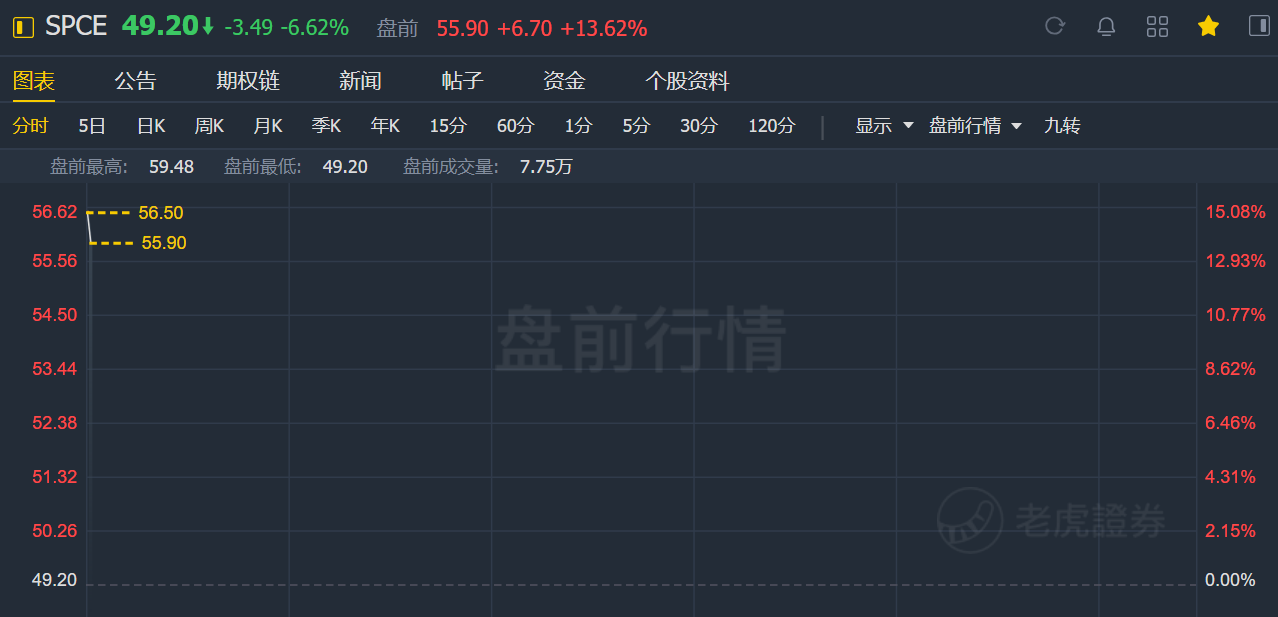Virgin Galactic shares jumps 13% in premarket trading,as Branson soared to space aboard Virgin Galactic flight.
British billionaire Richard Branson on Sunday soared more than 50 miles above the New Mexico desert aboard his Virgin Galactic rocket plane and safely returned in the vehicle's first fully crewed test flight to space, a symbolic milestone for a venture he started 17 years ago.
"We’re here to make space more accessible to all," an exuberant Branson, 70, said shortly after embracing his grandchildren following the flight. "Welcome to the dawn of a new space age."
HIGH-COST TICKETS
Virgin Galactic has said it plans at least two further test flights of the spaceplane in the months ahead before beginning regular commercial operation in 2022. One of those flights will carry four Italian astronauts-in-training, according to company CEO Michael Colglazier.
He said 600 wealthy would-be citizen astronauts have also booked reservations, priced at around $250,000 per ticket for the exhilaration of supersonic flight, weightlessness and the spectacle of spaceflight.
Branson has said he aims ultimately to lower the price to around $40,000 per seat as the company ramps up service, achieving greater economies of scale. Colglazier said he envisions eventually building a large enough fleet to accommodate roughly 400 flights annually at the spaceport.
The Swiss-based investment bank UBS has estimated the potential value of the space tourism market reaching $3 billion annually by 2030.
Proving rocket travel safe for the public is key.
An earlier prototype of the Virgin Galactic rocket plane crashed during a test flight over California's Mojave Desert in 2014, killing one pilot and seriously injuring another.
SPACE RACE
Branson's participation in Sunday's flight, announced just over a week ago, typified his persona as the daredevil executive whose various Virgin brands - from airlines to music companies - have long been associated with his ocean-crossing exploits in sailboats and hot-air balloons.
His ride-along also upstaged rival astro-tourism venture Blue Origin and its founder, Bezos, in what has been popularized as the "billionaire space race." Bezos has been planning to fly aboard his own suborbital rocketship, the New Shepard, later this month.
Branson has insisted he and Bezos are friendly rivals and were not racing to beat one another into space.
"We wish Jeff the absolute best and that he will get up and enjoy his flight," Branson said at a post-flight press conference.
Blue Origin, however, has disparaged Virgin Galactic as falling short of a true spaceflight experience, saying that unlike Unity, Bezos's New Shepard tops the 62-mile-high-mark (100 km), called the Kármán line, set by an international aeronautics body as defining the boundary between Earth's atmosphere and space.
"New Shepard was designed to fly above the Kármán line so none of our astronauts have an asterisk next to their name," Blue Origin said in a series of Twitter posts on Friday.
However, U.S. space agency NASA and the U.S. Air Force both define an astronaut as anyone who has flown higher than 50 miles (80 km).
A third player in the space tourism sector, Musk's SpaceX, plans to send its first all-civilian crew (without Musk) into orbit in September, after having already launched numerous cargo payloads and astronauts to the International Space Station for NASA.
The spaceplane's two pilots were Dave Mackay and Michael Masucci. The three other mission specialists were Beth Moses, the company's chief astronaut instructor; Virgin Galactic's lead operations engineer Colin Bennett; and Sirisha Bandla, a research operations and government affairs vice president.
All recounted afterward being mesmerized by the view through Unity's windows. Mackay described the immense blackness of space against the brightness of Earth's surface, "separated by the beautiful blue atmosphere, which is very complex and very thin."
"Cameras don’t do it justice," he told reporters. "You have to see it with your own eyes."



